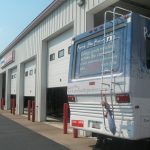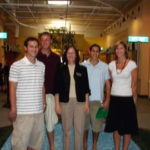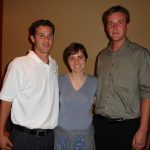Scott Hatley, founder of the non-profit Incight, is wheelchair-bound due to muscular dystrophy. That did not stop him, however, from graduating from the University of Portland, in 2001, and immediately starting his company, which offers employment and educational opportunities to people with disabilities. Scott was inspired by his summers spent at the Muscular Dystrophy Association’s summer camps. Scott realized that camp was the best part of the year for many of his friends, who did not otherwise envision themselves as normal people, with normal opportunities.
 Scott’s success is incredible. Incight is currently supporting 70 disabled scholars, in their college career track program. These students receive not only financial support, but also the support of mentors, and internship programs; all of this is intended to help people overcome, what Scott calls, their “handicrap.” This is the term coined to describe all of the excuses and self-imposed barriers and limitations many disabled people must confront, if they are to find their way in the world. Really, it is applicable to every person, who must overcome insecurity and fear, and just go after what they love.
Scott’s success is incredible. Incight is currently supporting 70 disabled scholars, in their college career track program. These students receive not only financial support, but also the support of mentors, and internship programs; all of this is intended to help people overcome, what Scott calls, their “handicrap.” This is the term coined to describe all of the excuses and self-imposed barriers and limitations many disabled people must confront, if they are to find their way in the world. Really, it is applicable to every person, who must overcome insecurity and fear, and just go after what they love.
Interview
So you’re from Portland?
Yep. Born and raised. From a little town called Westlin.
You’re the founder of Incight. How did you come up with this idea?
It developed from several different things. Growing up, I have muscular dystrophy. The Muscular Dystrophy Association has a summer camp each summer. It has kids 6-21 with pretty severe disabilities like what I have. For many of the kids, that was the highlight of their year, and is the highlight of their year. They don’t really look forward to anything else. This camp is a great thing and I’m glad people look at it as a highlight. But for me, when I graduated and couldn’t go anymore, I was looking on to the next step of what life held for me. I kind of always thought it was sad that this was the only thing they had in their life for that year. For me, it was the motivation to say, ‘Hey. You’ve got a disability, but there’s so much more you can do with your life than just going to this camp.
What I’ve seen is that even one person like myself going to college, graduating, and doing stuff, going back provides a lot more hope to the youth there. In a way, as we’ve grown Incight, we have five or six scholars with disabilities that have muscular dystrophy and go to this camp. And they’re coming back and providing everyone with hope.
On the one side, this didn’t exist. And on the other side, I just felt blessed that I had the opportunity to grow up in a place like Westlin. It’s a little bit more affluent community. For people with disabilities, there’s not a lot of expectation for what they’re going to do with their life. And in this Westlin culture, all of my friends were going to college. My parents went to college. So it was just natural that I would go to college.
When I went to college I went the University of Portland, which is a catholic college around town here. One of their main focuses is teaching faith and service. I really was inspired to do some kind of service related activity. I met some classmates there and I’m one of a couple founders. We had that experience with disability and wanted to get out there and empower more youth. Only about 16% of the disabled population goes to college and graduates. Only about one in five has a full time job. We looked at the stats and thought there was a huge need. The Americans with Disabilities Act has been around since 1990, and yet there is still a huge education and employment need.
We just went about it and had the courage to jump out and start a non profit. We figured out that we needed our 501 c3 for us to raise money. We got some initial partners and kept growing. Now we have 70 scholars with disabilities. Many of them are in Oregon, but it extends to other parts of the country as well.
B: So 70 scholars. You guys have been around for how many years?
About four years.
B: Four years. And that’s when you graduated school. Four years ago?
About 2001. I guess it’s going on six years now if you can believe that.
B: What was your major?
It was Organizational Communications.
B: What’s your favorite part about Incight?
I would say there’s several things that’s really my favorite. Seeing the students succeed is huge. Seeing the opportunity to create opportunities so they will succeed is huge. We’ve had several youth have great internships around town. Seeing them light up when they talk about that. Long term, seeing more students succeed and getting their full time job.
We actually have two students who will be graduating from college after four years coming up next May. It will be exciting to have the first couple job placements.
I also get a lot of energy getting out in the community and sharing Incight’s story and meeting people. Just continuing to create opportunities for our youth.
B: What’s the process? Is there an applicant? How do you help them and get them employment and education?
We’re on two tracks right now. We have the scholarship track. And we have a full application with that. Youth can find us on the internet and at fastweb.com. Scholarships.com. We also do a lot of outreach in the high schools and metro Portland area, as well as the state of Oregon. That’s another way youth find out about us.
So we’ve got two tracks. The college career track, which involved youth who have graduated from high school and want to move on to the next step, which involves scholarships, mentoring, and internships. What we’re developing more of is a high school outreach program. We’re getting into the high schools and inspiring the youth to realize what’s possible with their lives, and to realize they can get a job by following a dream.
We do a lot of different events where we bring in scholars with disabilities who are in college and they share their experience with the youth.
How important is what you’re doing to give these students the confidence and the courage to go out? You mentioned earlier was the only thing they had to look forward to was that camp. But I mean, are the possibilities really endless for people with disabilities to go out and follow what they’re passionate about?
I definitely think there’s lots of potential and is very important. We don’t serve just people with severe disabilities like people in a chair. We’re also serving people who are visually impaired and those who are deaf. Even some learning disabilities.
I think the key really is just helping change their mindset. We actually have a word we use. It’s on the back of my chair. The word is ‘Handicrap.’
Jay: I saw that on the way in.
It’s a fun word to throw out there. It summarizes more than shock and awe in that a lot of people with disabilities have their own personal handicrap. It might be hiding behind their disability. They might put up roadblocks by saying, ‘Hey, I can’t do that. I’ve got these chair challenges.’ Or I’m not as smart as the others. When they go into college, it really takes planning and preparation, even if you don’t have a disability.
Does that answer your question?
B: Well, how hard is it to break that mindset? Because you grow up with this and then you’re told that anything is possible. How hard is it to convince your scholars that it is possible despite the challenges?
It is a definite process. First it’s kind of planting the seed and hoping some of that sticks. A lot of what we do is a big reason why youth will be more successful long term, is that we don’t just give a scholarship and hope they succeed in college. It’s more of a mentoring process and being there for any questions. We’ll accompany youth on interviews for internships. We’ll help be a liason to help make that placement successful.
The idea is that as we work to mentor the youth’s mindset, that as time goes on, they’ll be able to break that and have enough internship experience to have that full time job.
Some of it’s still in the process as we’re growing and figuring out what the model looks like. That’s a definite exciting thing to think about.
Such ideas that we’ve thrown around, which are really more backburner right now, is we’ve talked about creating an Incight house. Youth could live there, because a big challenge for a youth with disabilities is issues of independence and needing extra care. Sometimes it’s hard for them to transition out of their family home.
So if we could create this Incight house where they could live, then they could have a community together where they’re pushing each other. Incight staff would have their office there. It would be like college almost, but it would give them the opportunity to challenge each other to pay rent and make that next step towards full independence.
Z: Couldn’t you do that at a college campus?
I think you probably could. Especially a big one like a University of Oregon. It’s so kind of out there that we haven’t really defined it yet. But the idea is that if we could get some kind of model here in Portland, we could easily expand it out to other states.
Z: Do you use specific schools that you try to place individuals in?
We don’t have a preference and don’t force youth to go to these schools. But one side benefit we’ve developed is we have a partnership with colleges in Oregon. We have five schools who are matching scholarships. If the student goes to that school, they’ll get double their scholarship. They’ve been really receptive. We’ve only been doing it over the last five, six months. I think that’s something that could expand to other states and schools for other scholars. Our goal is to get all seventy signed up by the end of the year.
B: That’d be cool. So for you personally in business, what’s been the biggest challenge you’ve had to overcome in forming this non profit?
I think for me, since I tend to be a perfectionist, it’s the fear of failure. Sometimes I’ve really had to push myself and saying that I really need to get out there and do it. It may not be perfect, but if you don’t do anything, how are you going to get the result? How are you going to know that it’s a good option?
I really push my boundaries of getting out of my comfort zone and not being afraid of failure. Which is also a big thing we push with our students. Get out of that comfort zone and just go for it.
Z: Do you feel susceptible, as far as your disability goes, that same nervousness of getting outside of your comfort zone even though you’re mentoring these youth? Is that ever anything you can grow out of? You’re obviously successful in running this non profit, but every day there’s probably new challenges in a sense. Is that something you still find yourself with?
It’s always kind of there. Sometimes I’m trying to determine whether it’s more my personality and less about any disability I have, but it’s a constant process. I’ve definitely made progress over the years. To see where I was five years ago and where I am now has been huge. A huge, huge difference. But still, on occasion, when you meet someone you get a little nervous about what they’re going to think or what’s going happen.
But I always try to remember that I am who I am. You just work to be the person you are and be comfortable as much as you can.
Z: Is that primarily the message you give to the people you work with?
That’s what we definitely work to do. We challenge them to not let boundaries get in your way. And show them as well that everyone has their own challenges. It’s just that more or less they’ve worked on them and made it a conscious part of their mindset.
B: Would you say confidence is the number one thing?
I would say so. Definitely. I think that’s the biggest thing to overcome. I mean some disabilities are really confident and out there.
B: That’s where Incight really comes in. You guys plant the seed, ‘Handicrap.’ Then you’re there to support them and mentor them every step of the way. That’s how they build up the confidence to get that employment and education.
Exactly.
B: So if you could go back to when you were 22 years old and offer yourself one piece of advice, what would you say?
One piece of advice. I was thinking about this. I feel like a lot of positive things have happened in the last six years since I was about that age. I think the biggest thing I would do is go back and shake myself and say that I need to get more involved. There’s so much more you can do.
I feel like in some ways I had a lot of courage and was able to jump out there and was able to do some things I thought I might be able to do. Yet, there were still times when I held myself back a little more than I should have.
I actually once heard someone say, ‘What’s the worst that can happen? They can’t eat you.’ I was thinking that I should have had that more. What’s the worst thing that can happen?
It would be fun to go back and show myself at 22 where I am now at 28 and say that it’s possible. You can do it. I feel that might have actually helped the process. I think I might have grown faster in those last six years than I did.
Z: A lot of people we have talked to have talked about the importance of mentors. Did you have someone that had a handicap, or was just a business person that was able to mentor you in a similar way to what you’re doing for these people?
Oh yeah. For sure. That’s been the big key that I should have mentioned. Mentoring has been huge. The other founder of Incight, Vail Horton, has been a huge, huge mentor for me.
We met at college. In a way, he’s been a huge encourager for me to keep going. He’s been a tireless adovocate to keep doing it. He has spent a lot of time developing a for profit, called Key Mobility. They make medical devices like crutches with shocks and wheelchair cushions.
But that has been a key mentor. I’ve had several mentors out in the business world who I’m always bouncing ideas off of. I say, ‘What do you think about this? What do you think I should do around here?’
I would also say that my family has been huge mentors as well. I think it would have been good if earlier on I focused on getting a few more mentoring relationships had it occurred to me when I was 22. It kind of started to set in more when I was 24. It’s been more of that mindset the last four years.
With our youth now, that’s definitely something we want to be communicating to them. They should be finding mentors. Because as you do internships, as you do different things, you’re going to find that it’s not totally what you want to do, or it’s not your passion. And you don’t really know that until you learn from experience.
B: So did you start Incight right after school? Or did you have a job?
Right out of college I was in that service mode, where I wanted to do something positive with my life, but I didn’t know what that was then. This friend and co-founder of Incight had started this for profit company. I saw him developing it through the center of Entrepreneurship at the University of Portland. Seeing him and another roommate in college involved with that made me think that I’d really like to be a part of it. I wanted a part in working with those with disabilities.
So I worked with the company Key Mobility for a year and then after that year, we got the idea to start Incight. We ran with that and I spent most of the time getting that going.
What’s the meaning behind the name, Incight?
We took two words to form Incight. Incite means, to spark a passion. Insight means intimate knowledge of. We stuck them together. It creates a good memorable name. It’s hard to tell people that Incight is spelled with a ‘c.’ But once they get the hang of it, it’s memorable.
How would you define passion?
How would I define passion? Passion for me is about three or four things. First of all, it has to have a personal connection. For me, it has to tie into a spiritual piece with my faith. That’s one key thing.
An opportunity for service. I would also say that it needs to be worthy of your time and talent as well.
I was thinking about passion and kind of like, ‘How do you develop a passion?’ It feels like passion needs to be like something where time can get away from you. You can all of a sudden get in the zone and who knows where the day went. But yet, you’re achieving a lot of great things.
But also to the point that it might infringe on other personal parts of your life. I’m thinking not so much that it won’t be a negative, but a positive thing. Maybe you’re working longer hours.
Those are a couple things. I was thinking there were a couple more things I wanted to say, but basically, more or less, that’s what I was thinking passion was.
Do you have personally have passion here?
Yeah. I would definitely hope I have passion. I definitely have passion. I don’t think I would have been able to have gotten to the point I am without passion there. I think with passion, it keeps you from getting burned out. You’re always excited when students succeed or we get that next big grant that will help more and more students.






